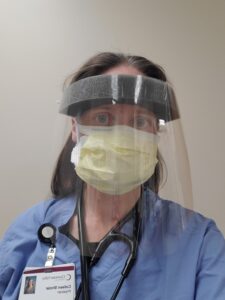 By Colleen Sholar, D.O., FAAFP, Chief of Medical Staff
By Colleen Sholar, D.O., FAAFP, Chief of Medical Staff
As a family physician I feel that a good portion of my role is to provide preventative care for both individuals and our community. With the ongoing pandemic, preventative care certainly has some new topics. During this time of a respiratory pandemic we cannot stress enough the measures to reduce the risk of infection for yourself and the spread of infection to others. Our local hospital is working hard to take care of our community but resources in our region, let alone state and nation, are overwhelmed and our healthcare system is not set up to treat the number of acutely sick for the long length of hospitalizations that we are seeing with those experiencing severe and critical respiratory COVID symptoms. We have backup plans to our backup plans to provide care for those who do become ill, but honestly, we’d rather it not come to that as our hospital has not suddenly found extra nurses, heart monitors, or all the other resources that it takes to manage those who, at any other time, would be ICU level respiratory illness.
These measures include but are not limited to:
1.) Social Distancing —as a side note, I really feel we did a disservice with this choice of term, I wish we had said physical distancing because we are social beings and I do not want us to lose our ties to family and friends, I just really need everyone to stop breathing on each other. Please mask around anyone who does not live in your household and consider if you really need to see them in person or if a virtual visit would have served the purpose.
2.) Masking— there are times when we do need to be within reach of each other or moving about in the same indoor space as we are a developed society with complicated interactions. So, we ask that you wear a mask made of at least 3 layers of a tightly woven cotton, and please cover both your mouth and nose. Trust me, I’ve been wearing a mask since spring and it’s not horrible. If you are having trouble with a mask wear it for 5 minutes at home and gradually wear it for longer and longer to desensitize yourself, you can breathe through material… it blocks big spit globs, not oxygen.
3.) Isolate Yourself If You Are Sick— please be mindful of symptoms of a viral illness (think sore throat, congestion, cough, fever) and if you are sick stay home, none of us are so important that we should risk the health of others.
With this said, I think that our more traditional recommendations for preventative care still apply and perhaps even more so as the stressors of the pandemic weigh on us.
These measures include but are not limited to:
1.) Stress Management— this means different things to different people. It might mean taking up a relaxation technique like yoga or meditation, it might mean recognizing your triggers and managing your responses, it might mean counseling or it might mean seeking the help of your medical provider. If you are feeling anxious, depressed, down, hopeless or having intrusive thoughts please seek help.
2.) Sleep Hygiene- I can’t stress this enough, improving sleep is a long process but it’s worth the work to reduce your risk of many chronic illnesses. http://sleepeducation.org/essentials-in-sleep/healthy-sleep-habits.
3.) Tobacco Cessation— smoking greatly increases your risk of worse respiratory symptoms with acute illness as well as increasing your risk of COPD, lung cancer and many other cancers. This is an expensive habit for both your health and your wallet. Idaho has free resources, your medical provider can help with medications and we have a behavioral specialist to help as well.
4.) Moderating or Avoiding Alcohol- It is recommended that men consume no more than 2 alcoholic servings a day and women no more than 1 a day. If you are drinking more please consider the ramifications as heavy daily drinking or binge drinking increases the risk of violence, accidents, liver diseases like cirrhosis or cancer, as well as cardiovascular disease like heart failure. If you need help please talk to your medical provider.
5.) Cancer Screenings— unfortunately cancers are not going to stop just because we have a pandemic. Our clinic is set up to provide safe care with physically distancing individuals, masking of everyone in our buildings and you’ll see all of our staff wearing face shields as well to help protect you and ourselves. So please do continue with:
- Breast Cancer Screening (for most women the recommendation is every 2 years over the age of 50).
- Colon Cancer Screenings (recommended for all after the age of 45 now, though this recently changed from 50. Maybe this is a good year to do a stool FIT test if you are wanting to avoid a colonoscopy during the pandemic and you can do the colonoscopy next year if this stool test is negative).
- Cervical Cancer Screenings (recommended to start in all women at the age of 21).
- Lung Cancer Screenings (consider starting at age 55 for those who are candidates).
- Skin Cancer Evaluations if you have any suspicious moles or non-healing spots.
- Management of Chronic Conditions- If you are struggling to manage a chronic condition your medical provider wants to help you get this under control. High blood pressure, diabetes, obesity, asthma, and COPD to name a few can lead to serious long term problems but these risks can be reduced.
- Telemedicine follow-up appointments are available to help manage these if you don’t want to come into clinic.
We at Clearwater Valley Hospital and Clinics are here working in our community to help improve the health and lives of all of us in our community. We are happy to do so, but we can’t do it for you, so please do your part!
